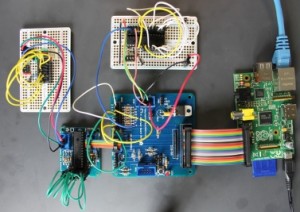Countdown to Thursday - three days to go
I'm racing ahead with preparations for this Thursday's Kids Adore Ditch.
I've already had one small problem to overcome.
HobbyTronics offered the best price, and for an additional charge I asked for delivery on Saturday Morning. The new robot arrived on time and I started to prepare the demo.
I have the GNU gc++ avr cross compiler and avrdude installed on my workstation already, so it took me less than five minutes to compile and load a simple LED blinker on the 3Pi. Another minute and I'd installed the Line follower.
I quickly laid out a simple maze design and installed the maze example from the Pololu library. As luck had it, my maze was close to perfect; the robot explored every path before it found the goal. Once it's mapped the maze, it shows the shorthand for the solution on its LCD display and then navigates as directly as possible from start to finish.
If I have time I'll make some more mazes, and maybe do a larger one A1 size.
Once that's done I will need to mend the second 3Pi and prepare it. I have come up with a very different demo, but I will have to code it from scratch, We'll see if I can get it done in time!
I've already had one small problem to overcome.
Poorly 3pi
When I looked closely at my 3pi on Friday I realised that the mounting bracket of one of the motors is broken. I've ordered a replacement but it will not arrive until Wednesday at the earliest. I had two 3Pi demos in mind, and I'm a bit wary of reprograming on the day, so I decided it was time to get a second robot.HobbyTronics offered the best price, and for an additional charge I asked for delivery on Saturday Morning. The new robot arrived on time and I started to prepare the demo.
Great documentation from Pololu
It's been a while since I did anything with these robots, so I needed to remind myself about how to program them. I love the documentation on the Pololu web site: it's simple, clear and correct, and covers Windows, Linux and OS/X users.I have the GNU gc++ avr cross compiler and avrdude installed on my workstation already, so it took me less than five minutes to compile and load a simple LED blinker on the 3Pi. Another minute and I'd installed the Line follower.
Making tracks
I used the approach suggested on the website and laid out a simple track using A2 paper and black electrical tape. The robot did a good job of following the line, but the demo soon palls and I wondered if the Maze solver program might have more lasting appeal.I quickly laid out a simple maze design and installed the maze example from the Pololu library. As luck had it, my maze was close to perfect; the robot explored every path before it found the goal. Once it's mapped the maze, it shows the shorthand for the solution on its LCD display and then navigates as directly as possible from start to finish.
The 3pi shows off its brainpower
If I have time I'll make some more mazes, and maybe do a larger one A1 size.
Plenty more to do
First, though, I have other demos to prepare. I had to install a fresh rasbpian image on C3Pi, so I need to set up the wifi and install the relevant Python software on the on-board Raspberry Pi. At least the Arduino pro mini doesn't need reprogramming. I must also remember to install a fresh set of batteries in C3Pi, which is not a trivial task!Once that's done I will need to mend the second 3Pi and prepare it. I have come up with a very different demo, but I will have to code it from scratch, We'll see if I can get it done in time!



Comments
Post a Comment